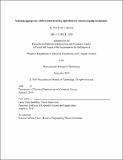| dc.contributor.advisor | Leslie Pack Kaelbling. | en_US |
| dc.contributor.author | LaGrassa, Alex Licari. | en_US |
| dc.contributor.other | Massachusetts Institute of Technology. Department of Electrical Engineering and Computer Science. | en_US |
| dc.date.accessioned | 2020-03-24T15:36:27Z | |
| dc.date.available | 2020-03-24T15:36:27Z | |
| dc.date.copyright | 2019 | en_US |
| dc.date.issued | 2019 | en_US |
| dc.identifier.uri | https://hdl.handle.net/1721.1/124251 | |
| dc.description | This electronic version was submitted by the student author. The certified thesis is available in the Institute Archives and Special Collections. | en_US |
| dc.description | Thesis: M. Eng., Massachusetts Institute of Technology, Department of Electrical Engineering and Computer Science, 2019 | en_US |
| dc.description | Cataloged from student-submitted PDF version of thesis. | en_US |
| dc.description | Includes bibliographical references (pages 73-78). | en_US |
| dc.description.abstract | Engineering reinforcement learning agents for application on a particular target domain requires making decisions such as the learning algorithm and state representation. We empirically study the performance of three reference implementations of model-free reinforcement learning algorithms: Covariance Matrix Adaptation Evolution Strategy, Deep Deterministic Policy Gradients, and Proximal Policy Optimization. We compare their performance on various target domains to measure quantitatively their dependence on varied features of the environment. We study the effect of actuation noise, observation noise, reward sparsity and task horizon. Then, we explore automatically generated state encodings for learning using a lower-dimensional encoding from high dimensional sensor data. A proof-of- concept end-to-end system for scooping beads of different sizes in the real world generates, uses, then follows force traces along with a positional controller to execute a scoop. | en_US |
| dc.description.statementofresponsibility | by Alex Licari LaGrassa. | en_US |
| dc.format.extent | 78 pages | en_US |
| dc.language.iso | eng | en_US |
| dc.publisher | Massachusetts Institute of Technology | en_US |
| dc.rights | MIT theses are protected by copyright. They may be viewed, downloaded, or printed from this source but further reproduction or distribution in any format is prohibited without written permission. | en_US |
| dc.rights.uri | http://dspace.mit.edu/handle/1721.1/7582 | en_US |
| dc.subject | Electrical Engineering and Computer Science. | en_US |
| dc.title | Selecting appropriate reinforcement-learning algorithms for robot manipulation domains | en_US |
| dc.type | Thesis | en_US |
| dc.description.degree | M. Eng. | en_US |
| dc.contributor.department | Massachusetts Institute of Technology. Department of Electrical Engineering and Computer Science | en_US |
| dc.identifier.oclc | 1145122826 | en_US |
| dc.description.collection | M.Eng. Massachusetts Institute of Technology, Department of Electrical Engineering and Computer Science | en_US |
| dspace.imported | 2020-03-24T15:36:26Z | en_US |
| mit.thesis.degree | Master | en_US |
| mit.thesis.department | EECS | en_US |
